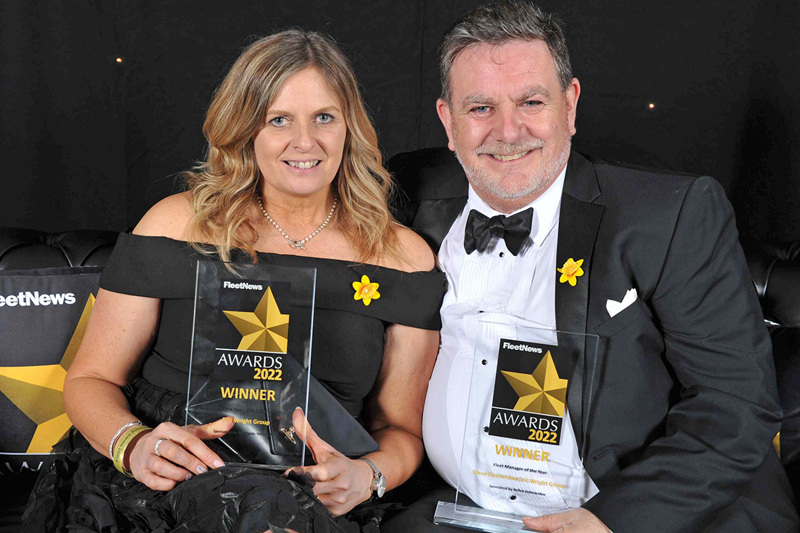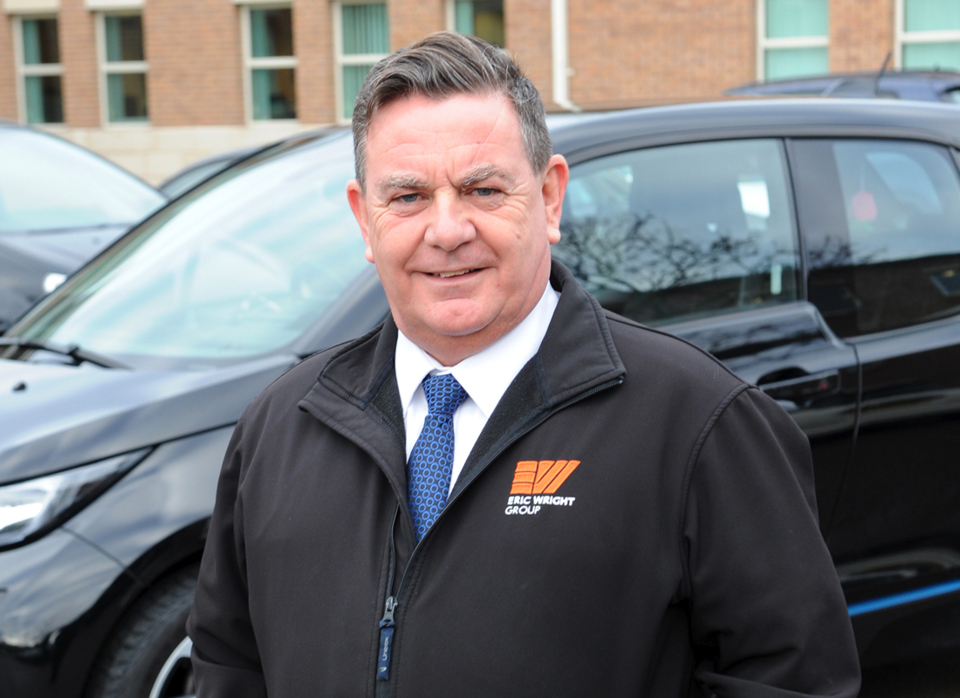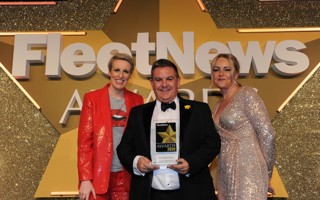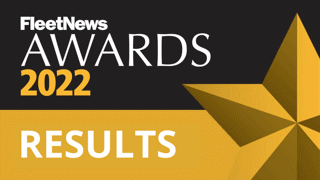The most heralded benefits of electric vehicles are usually their lower emissions and reduced running costs, but Eric Wright Group has experienced another: improved safety.
Together with a continual improvement in driver communications and training and a robust vehicle handover procedure, the rapid adoption of EVs has seen the company reduce the number of recorded incident rates by 10 percentage points to 15% over the past five years.
“When someone takes on an EV and we do the vehicle handover, we go over the changes they should make to their driving style,” says Steve Openshaw (pictured), group fleet manager at Eric Wright Group, which won the fleet of the year (251-1,000 vehicles) category at this year’s Fleet News Awards. Openshaw was also named fleet manager of the year.
“It’s helped me to say ‘leave a gap in front as more gradual braking will help conserve your battery’, and it refreshes in people’s minds they don’t need to be that close, they should leave a bigger gap, which reduces the likelihood of driving into the back of someone.
“There’s also a calming influence from driving an EV and we can push that as a reminder to people that they should concentrate like they used to when they first passed their test.”
This improvement in collision rates has been accelerated by the construction company’s rapid adoption of EVs.
It had originally set a target of 50% of its car fleet being ultra-low emission vehicles (ULEVs) by 2025, but has already smashed this figure. Currently, around 63% of the car fleet are ULEVs, with 44% battery electric vehicles (BEVs).
The most heralded benefits of electric vehicles are usually their lower emissions and reduced running costs, but Eric Wright Group has experienced another: improved safety.
Together with a continual improvement in driver communications and training and a robust vehicle handover procedure, the rapid adoption of EVs has seen the company reduce the number of recorded incident rates by 10 percentage points to 15% over the past five years.
“When someone takes on an EV and we do the vehicle handover, we go over the changes they should make to their driving style,” says Steve Openshaw (pictured), group fleet manager at Eric Wright Group, which won the fleet of the year (251-1,000 vehicles) category at this year’s Fleet News Awards. Openshaw was also named fleet manager of the year.
“It’s helped me to say ‘leave a gap in front as more gradual braking will help conserve your battery’, and it refreshes in people’s minds they don’t need to be that close, they should leave a bigger gap, which reduces the likelihood of driving into the back of someone.
“There’s also a calming influence from driving an EV and we can push that as a reminder to people that they should concentrate like they used to when they first passed their test.”
This improvement in collision rates has been accelerated by the construction company’s rapid adoption of EVs.
It had originally set a target of 50% of its car fleet being ultra-low emission vehicles (ULEVs) by 2025, but has already smashed this figure. Currently, around 63% of the car fleet are ULEVs, with 44% battery electric vehicles (BEVs).
The company has also rolled out online driver risk assessments to all new starters as soon as they begin their employment with Eric Wright Group.
“People can be averse to a driver risk assessment as they think it’s pass and fail, but it’s not like that,” says Openshaw.
“I tell them that it’s a learning tool: they may need to do something on hazard perception or speeding, or it could be that they are getting an electric vehicle and they’ve never driven one before.”
As well as identifying any areas for improvement, the process also sets the tone for what is expected from a driver while they are working for Eric Wright Group.
Ongoing communication

Safety awareness is also increased through the fleet team of Openshaw and group fleet controller Sue McGuigan (the two are pictured with their awards) being in regular, ongoing communication with drivers through initiatives such as toolbox talks and distribution of information on topical issues such as drink- and drug-driving, as well as severe weather.
“Everybody thinks this is about just ice and cold. But just a couple of weeks ago we had 40C heat, so we make sure that drivers know they need to stay hydrated because 10% dehydration can have the same effect as being over the drink-drive limit,” says Openshaw.
“The reaction has been ‘wow, I didn’t know that’, so getting good information out to the drivers gets them on board with us.
“We have the same reaction from people who join us and are on cash allowance. We do an assessment on the vehicle and everything, but a lot of people have come without business insurance.
“We tell them they need it, they say they’ve got cover to commute to one place of work, but when we tell them that isn’t what they need they say ‘we’ve never been told that before and I’m glad you told me because literally I wasn’t insured’.
“This all adds to them knowing that we’re approachable, we’re conscientious, we’re looking after safety, we’re looking after the drivers.”
Openshaw, who is undergoing training to become a qualified driver assessor, says the telematics and dashcams fitted to Eric Wright Group’s commercial vehicles have also helped improve driver behaviour.
Despite initial resistance from drivers, any concerns were quickly overcome.
“Some of the drivers thought we were just monitoring them, but it is also there to help them. I tell them if they have an incident, I’ve got all the evidence I need to defend you either way.
“If someone says you were doing 90mph but you say you were doing 70mph, I can prove you were doing 70mph.
“We’ve had instances where we’ve followed up ‘How is my driving?’ reports against people, and found them to be spurious. One of the really vocal anti-telematics drivers had an incident and we were able to defend him. After that, the telematics and camera were the best thing since sliced bread; the drivers could see it was there to help them.”
Eric Wright Group has also reduced reporting time of any incidents, so more than 95% of all collisions are now reported on the same day, helping it and its insurers to react quickly and manage the situation efficiently. Openshaw says:
“The financial savings are something you can’t quantify, but you know the insurers are really happy with what we’re doing.
“Every time they say our risk level is really low, they’re more than happy.”
One of Openshaw’s key fleet priorities for the next 12 months is to reduce damage cost, which includes continuing with toolbox talks with more focus on the commercial fleet and letting drivers know the true cost of a collision.
“It’s not just the actual repair cost, it’s the ancillary cost behind it, but the way you can cut your cost is by not having an accident in the first place,” he adds. “The area we’ve got to address really is changing lanes.”
Rapid electrification
Eric Wright Group’s rapid adoption of EVs has put it ahead of the construction industry average and reflects its ethos of promoting environmental impact and sustainability.
“This is not just to talk about it or gloss over it, but to do it. Let’s stick that investment in,” says Openshaw.
He was an early adopter of electric vehicles himself, taking on a Vauxhall Ampera nine years ago, and his experiences of both this and a BMW i3 range-extender, in which he travelled 48,000 miles and used just 30 litres of fuel, has helped win driver buy-in for the technology.
His experience showed drivers could quite easily live with an EV which had a range of around 120 miles: far lower than the majority of BEVs now available.
The public charging network has also grown significantly since the early days of electrification, with Openshaw saying it is now “utopia” compared to when he took on his Ampera.
Eric Wright Group is also making a significant investment in workplace charging and is having 18 7kW chargers and two 22kW units installed at its Preston head office.
To facilitate this, the company has invested in its own, sole-use substation to cope with the increased demand. This will also provide enough capacity to allow for significant expansion of the charging infrastructure in the future.
The charge points will be available for use by both employees with company cars and those not eligible for the benefit. Openshaw says this will help the group with recruitment in future. This will increase its appeal to potential employees who want an electric car but are not able to charge at home due to either not having off-road parking or living in rented accommodation which does not have a charge point.
Charging issues
However, while Eric Wright Group is powering ahead with the adoption of electric cars, none of its 150 commercial vehicles are zero emission yet. Openshaw expects this to change next year.
He has used telematics data on mileages to analyse which vans could be transitioned to EVs now, with “probably 20%” of the fleet suitable.
“But I need the charging infrastructure in place,” he says. Eric Wright Group employees take their vans home at the end of each working day, so the ideal time to charge them would be overnight.
However, many employees do not have off-road parking so may need to rely on the currently insufficient on-street parking infrastructure, while some residential areas have restrictions on where commercial vehicles can be parked overnight, says Openshaw.
If an employee does have a driveway and a home charger, they may also be unwilling to use it for their work van if it means leaving their own car on the road, he adds.
The current public infrastructure is geared massively towards cars with spaces either too small or inaccessible for larger vans.
“There are height restrictions which mean you can’t get your van in, you’ve got to go nose in and have you got the room to do that?,” says Openshaw
“So there are still issues there, but there are vehicles available and if the driver profile is right you can do it, but you need to know how and where you’re going to charge.”
One solution he is working on would see Eric Wright Group install charge points at construction sites it is working on and these could be left for public use after the contract is completed.
“Initially we’re looking at sites where we’ve got a long-term commitment, so maybe 10-to-15-year contracts,” says Openshaw.
“A lot of them are health centres or education places, so we could be helping the National Health Service and education system if we can install them and they take them on from there.”
Openshaw on...
Vehicle supply problems...
We’ve dealt with it by early ordering so we are now ordering for Q2 next year, knowing that if needs be we can just extend our current leases that little bit longer.
If we left it to two or three months before the vehicle change is due like we used to, we might be needing to extend the lease for another 18 months, whereas now it may be just for six or 10 months.
We have had some orders cancelled because the manufacturers just can’t fulfil them within a realistic timescale but then – all of a sudden – vehicles are available.
You need to constantly talk with your supplier leasing company, and the manufacturers.
Sometimes the model year of a vehicle will change because of the long lead times. The leasing company says the terms originally offered don’t match that for the new model year, but the manufacturer may send through an instruction saying they will match the previous terms, so it’s about linking those people together to make sure they do.
Fuel costs...
Our fuel bill has gone up considerably, but we’ve got a procurement team now looking at fuel, at possible alternative fuels and maybe different fuel cards that we can use.
We’re also looking at whether journeys are essential. Is it essential for someone to be in the office today? If not, maybe you don’t make that journey so you’re not using any fuel.
Even though that will be my private fuel it is still carbon emissions, which we’ve got to record.
I’ve also just sent out a message for our drivers to look at what they are carrying in their vans because this tends to build up over time.
Fleet Manager of the Year winner: Steve Openshaw
Sponsors’ comments:
Reflex Vehicle Hire has proudly sponsored the Fleet News Awards for many years. The awards represent the pinnacle of fleet success and honour excellence, innovation and quality. Fleet News highlighted and celebrated the very best achievements and successes of the motoring industry. Reflex sponsored Fleet Manager of the Year at the 2022 awards, which saw a high calibre of entrants making the shortlist, which is a huge achievement. This category highlights the winner’s commitment to efficiency, safety, the environment and driver satisfaction. The criteria for this accolade aligns with Reflex’s core values of safety, recognising the importance of a competent fleet manager in the smooth operation of a fleet. Congratulations to Steve Openshaw from Eric Wright Group who was a very deserving winner. Reflex look forward to supporting the 2023 awards at the glistening gala.
Fleet of the Year – 251-1,000 Vehicles winner: Eric Wright Group
Sponsors’ comments:
Northgate Vehicle Hire is delighted to have presented the Fleet of the Year Award to Eric Wright Group. Adam Naylor, UK head of sales, who presented the award said: “It is clear that the fleet policy changes developed and implemented by Steve Openshaw and his team are delivering significant benefits to the company. To be so far ahead of their original ultra-low emission targets is a fantastic achievement and it is fitting that they have been recognised on this the industry’s biggest night. We’d also like to offer our congratulations to the other two finalists in this category, Oxford City Council and Platform Housing, on their success in the awards.”
Login to continue reading.
This article is premium content. To view, please register for free or sign in to read it.






















Login to comment
Comments
No comments have been made yet.